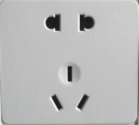Utilities

Electricity
Mains electricity in China is 220 V. If you are travelling from a country that uses 110 V mains supply (e.g. Japan, North America), you may need a converter for electrical devices (e.g. hairdryer, electric shaver).
need a converter for electrical devices (e.g. hairdryer, electric shaver).
There are two types of wall socket in China (see photo). Some wall points only have one of the two socket types. The two-pin socket at top can take plugs with two flat pins (Type A, as long as the two pins are the same size), or two round pins (Type C/E/F). German standard plugs should fit these. The three-pin socket at bottom takes Type I pins (same as Australia and New Zealand).
You may also find extension packs with universal sockets, which can take UK and other types of plug.
If in doubt, bring a universal adapter plug with you. These can also be bought in China.
Gas
In most housing complexes, natural gas for cooking and heating water is piped directly into homes. Gas costs RMB 2.28 or RMB 3.23 per cubic meter (at time of writing) depending on the complex. Many Beijing residents use top-up cards that can be recharged online or at selected banks. After it has been recharged, the card must be inserted into the gas meter and held for a few seconds. When you hear a “beep,” that means the balance has been updated.
Water
In water-starved Beijing, household tap water is relatively expensive at around RMB 4 to 5 per cubic meter. Tap water should not be drunk directly, but is safe to drink after boiling.
Heating System
Central heating is included in the price of rent in Beijing. In the vast majority of apartment complexes, heating is centralized, piped from a local heating plant to the apartments. Typically, the heat is turned on around November 15 and turned off around March 15 unless temperatures are unseasonably low. Most apartments have air conditioning units with heat settings that can be used to fill the gap between the onset of cold and the arrival of central heating. Beijing is extremely dry in winter, and this is exacerbated by central heating and air conditioning, so you may wish to buy a humidifier.
Online Payments
The simplest way to pay for utilities is online. Both WeChat and Alipay have English interfaces and allow users to top up their water, gas, electricity, and mobile phones. The first step is to open a domestic bank account and enable online banking in person.
To pay electricity, link your utilities account to the payment platform, then specify the amount of money you want to recharge. To complete the transaction, enter your six-digit Alipay or WeChat Wallet payment PIN.
For water or gas, input the invoice number (nine digits for water and 10-11 digits for gas) into the relevant field in Alipay or WeChat Wallet. The system will automatically pull up your account balance, and then you can pay as normal.